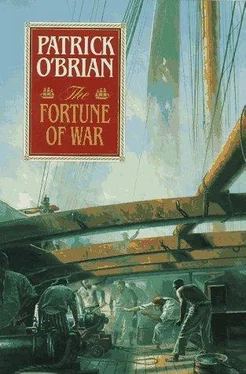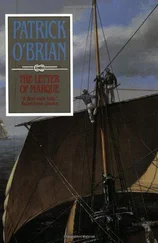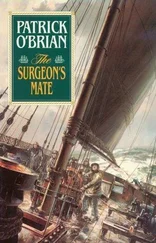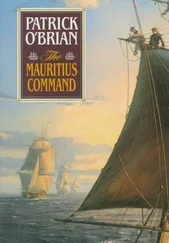Patrick O'Brian - The fortune of war
Здесь есть возможность читать онлайн «Patrick O'Brian - The fortune of war» весь текст электронной книги совершенно бесплатно (целиком полную версию без сокращений). В некоторых случаях можно слушать аудио, скачать через торрент в формате fb2 и присутствует краткое содержание. Жанр: Книги. Описание произведения, (предисловие) а так же отзывы посетителей доступны на портале библиотеки ЛибКат.
- Название:The fortune of war
- Автор:
- Жанр:
- Год:неизвестен
- ISBN:нет данных
- Рейтинг книги:3 / 5. Голосов: 1
-
Избранное:Добавить в избранное
- Отзывы:
-
Ваша оценка:
- 60
- 1
- 2
- 3
- 4
- 5
The fortune of war: краткое содержание, описание и аннотация
Предлагаем к чтению аннотацию, описание, краткое содержание или предисловие (зависит от того, что написал сам автор книги «The fortune of war»). Если вы не нашли необходимую информацию о книге — напишите в комментариях, мы постараемся отыскать её.
The fortune of war — читать онлайн бесплатно полную книгу (весь текст) целиком
Ниже представлен текст книги, разбитый по страницам. Система сохранения места последней прочитанной страницы, позволяет с удобством читать онлайн бесплатно книгу «The fortune of war», без необходимости каждый раз заново искать на чём Вы остановились. Поставьте закладку, и сможете в любой момент перейти на страницу, на которой закончили чтение.
Интервал:
Закладка:
A gang of these jolly carpenters moved him over to windward so that they could get at a gaping wound in the deck, hitherto covered with a tarpaulin - moved him quite gently. 'Mind where you put your foot, squire; there are holes enough to fill a wagon.' Plenty of holes indeed; the ship had been filled with the sound of hammering ever since they left San Salvador; but he was so used to it by now that this fresh outburst close at hand did not interrupt his thoughts. A gentlemanly set: he recalled their extreme care that nothing belonging to the Java's officers should be lost or looted. He remembered a huge American midshipman appearing with his diary and Jack's sheaf of papers folded into it and asking 'who the black book belonged to?' He not only still possessed his diary and his writing-case but every last handkerchief and pair of stockings bestowed upon him - some of the givers now dead, alas, more than three thousand miles astern. The word 'diary' made him frown, but the perpetual streaming wake carried his thoughts along, or rather the succession of images, and against that churning whiteness he once again beheld the ceremony in San Salvador at which the American commanding officer, Commodore Bainbridge, had addressed all his captives who were in a fit state to hear him, stating that if they would give their word not to serve against the United States until they were duly exchanged they might go straight home to England in two cartel ships. Then the more private ceremony at which General Hislop, in his own name and in that of Java's surviving officers, presented the commodore with a handsome sword in acknowledgment of his kindness to the prisoners - a kindness that extended not only to their ordinary belongings but even to the Governor's magnificent service of official plate, a circumstance that may have added to Hislop's eloquence.
Diary: the word jagged at his consciousness and he returned to consider it. He had given way to two dangerous indulgences in his time: laudanum was one, the bottled fortitude, the nepenthe that had tided him over some of his worst times with Diana Villiers and that had then turned into a tyrannical master. Diary-keeping was the other: a harmless and even a useful occupation for most, but unwise in an intelligence-agent. To be sure, in most places the manuscript was encoded three deep, in a cipher so personal that it had baffled the Admiralty's cryptographers when he challenged them with a sample. Yet there were some purely personal parts in which he had used a simpler system, one that an ingenious, puzzle-solving mind with a knowledge of Catalan could make out, if he chose to spend the necessary labour. It would be labour lost, from the point of view of intelligence, since these sections dealt only with Stephen's passion for Diana Villiers over all these years. Yet even so he was very, very unwilling that any other eye should see him naked, see him exposed as a helpless tormented lover, a nympholept furiously longing for what was beyond his reach; and even more unwilling that any man should read his attempts at verse, Catullus-and-water at the best. A very great deal of water, though the fire might perhaps be the same: nescio, sed fieri sentio et excrucior.
He did not really fear that any important part could be deciphered, but it would have been wiser to toss the diary overboard with a weight attached, as Chads had thrown the Java's signal-book in its leaden covers and General Hislop his despatches; and although he valued it extremely (apart from anything else he often needed a portable, infallible, artificial memory) he probably would have done so, if he had not had seven amputations on his hands. A foolish slip: an intelligence-agent should carry nothing that did not bear its apparent explanation on its face, nothing that could arouse suspicion of a code. He had not claimed the book until they were in San Salvador, and when he did so the Commodore asked him whether the book had anything to do with the Java's cipher or signals, or whether it was of a private nature. Mr Bainbridge was sitting in the great cabin, obviously in considerable pain from his wounded leg, with Mr Evans and a civilian beside him; and it appeared to Stephen that the three Americans looked at him very attentively as he assured the Commodore that the entries in the book were of a purely personal, medical, and philosophic nature.
'And what of these papers?' asked Bainbridge, holding up the sheaf.
'Ah, those have nothing to do with me,' said Stephen carelessly. 'I believe Captain Aubrey's steward brought them aboard: one looks very like his commission.' He leafed through the diary and showed Mr Evans various anatomical drawings - the alimentary tract of the sea-elephant that covered two pages, the whale-bird's oviducts, the flayed hand of a man suffering from calcification of the palmar aponeurosis, some dissected aborigines.
Mr Evans expressed his admiration: the civilian said, 'May I ask, sir, why the text appears to be disguised?'
'A personal diary, sir,' said Stephen, 'is best considered as a mirror in which a man may see himself: few men, who set down their shortcomings with the utmost naked candour, would wish to have them read by others. A medical diary, recording the symptoms, sufferings, and treatment of named patients, must also be secret: Mr Evans will support me when I say that secrecy, total discretion, is one of the most important duties of our profession.'
'It is part of the Hippocratic oath,' said Mr Evans.
Stephen bowed, and went on, 'And lastly, it is notorious that the natural philosopher is extremely jealous of his discoveries; he wishes to have the credit of first publication; and he would no more share the glory of a new-found species than a naval commander would wish to share his capture of a ship.'
The argument went straight home, and the commodore handed over the book. The civilian appeared somewhat less satisfied, however: who was he? The consul? He was neither named nor explained. He said, 'I believe you belonged to the Leopard, sir?'
'Just so, sir,' said Stephen, 'and it was aboard her, in the high southern latitudes, that I made the greater part of these discoveries, and these drawings.'
He had the diary back: but although he retained it he had in some degree taken against the book and illogically he no longer set his private mind on paper, as he had done for so many years. Apart from notes recording the appearance of various birds, his last entry was that of many days ago: 'Now I know what Jack Aubrey will look like when he is sixty-five.'
He had the diary back: yet an uneasiness remained. Had not the Americans been strangely ready to grant his request when he asked leave to accompany those patients who were too sick to be moved from the Constitution, Jack and the two quarter-gunners who had been buried at sea a week ago, the ship heaved to and her bell tolling as they went over the side? Had he put his head into a trap? What was the true nature of the passengers the ship was carrying from San Salvador to Boston? One was certainly a consular official, a foolish little man whose only care was his luxuriant whiskers, a tiny politician for whom the world might fall apart so long as the Republicans remained in power. The other two were Frenchmen; the first a small, subfusc, grey, middle-aged man with a liverish face who wore grey small-clothes, the kind of stockings that Franklin had made fashionable in Paris many years before, and a blue-grey coat; he was almost never seen on deck, and when he was, he was always being sick over the side, usually the windward side. The other was a tall, military-looking civilian, Pontet-Canet, who seemed at first sight to be as vain as the consular young man, even more loquacious and quite as silly; yet Stephen was not sure. Nor was he sure that he had not seen Pontet-Canet in some other place. Paris? Barcelona? Toulon? If he had, then it was certainly without those jet-black whiskers. But he had seen so very many people, and there were innumerable tall vain Frenchmen who dyed their hair and spoke with a strong Burgundian accent. A secret agent needed a prodigious memory: he also needed a diary to supply those inevitable gaps and failures.
Читать дальшеИнтервал:
Закладка:
Похожие книги на «The fortune of war»
Представляем Вашему вниманию похожие книги на «The fortune of war» списком для выбора. Мы отобрали схожую по названию и смыслу литературу в надежде предоставить читателям больше вариантов отыскать новые, интересные, ещё непрочитанные произведения.
Обсуждение, отзывы о книге «The fortune of war» и просто собственные мнения читателей. Оставьте ваши комментарии, напишите, что Вы думаете о произведении, его смысле или главных героях. Укажите что конкретно понравилось, а что нет, и почему Вы так считаете.












